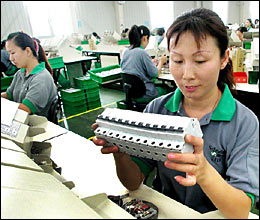
According to the Chinese Academy of Social Sciences (CASS), China is now home to some 99 million migrant workers, virtually all of whom have moved from rural to urban areas in search of better jobs.
Once upon a time they came to the cities in droves, many of them wandering the streets and desperate for work.
But in 2004, migrant workers began to come into their own as a social force: The labor shortage in the Pearl River and Yangtze River deltas and a number of random strikes indicate that the workers have recognized their importance to the economy. Now they are demanding that their employers recognize it, too.
The stream of farmers pouring into the cities during the past two decades seemed so inexhaustible that most people didn't even notice when the first signs that it was drying up apppeared. But by the latter half of 2004, the Ministry of Labor and Social Security reported that a significant labor shortage did exist in certain areas. The dearth of young female workers – the most sought-after group for manufacturing and processing jobs – was particularly pronounced.
The Pearl River Delta, southeastern Fujian Province and southeastern Zhejiang Province abound with the factories that rely on such women to fill orders, but now those areas are unable to fill 10 percent of their positions. The Pearl River Delta region alone lacks 2 million workers.
It wasn't hard for the labor ministry to figure out why. Wages hadn't been raised in years, even though the companies were hauling in virtual buckets of gold and regional costs of living rising substantially. Meanwhile, hours were growing longer without compensation, while regulatory limits on work hours or days were largely ignored. Essentially, employees' rights were trampled.
By mid-2004, the problem had become serious. Without enough workers, many of the companies found themselves unable to fill orders. Some made plans to move inland, where recruiting would be easier. In an effort to keep them where they were, local governments joined the companies in their recruiting efforts.
In the Pearl River Delta, migrant workers struck for their legal rights. According to Dr. Liu Kaiming, head of the Shenzhen Modern Society Observation Institute, at least three strikes involving 2,000 to 3,000 workers each occurred in Shenzhen in the past year.
Liu says that many of today's migrant workers are better educated than those of years past, and more than a few are junior college or technical school graduates.
Unlike their silent, docile predecessors, the current generation of migrant workers has access to new telecommunication technologies, such as mobile phone SMS, and they know how to use it. If they aren't already familiar with safeguards for their rights and interests, they can find out.
Today's migrant workers are not merely scrounging for a full rice bowl in the cities. They want their due political, economic and social rights as well. Researcher Wang Chunguang of CASS said that they are looking for the same treatment as their urban peers: higher salary, improved working and living conditions, basic social security and the right to education for their children.
In the past, their requests for such basic compensation received not even a modicum of consideration. But since Premier Wen Jiabao began pressing for timely payment of wages in October 2003, many workers have received their salaries long held in arrears. Zhejiang, Shandong and Guangdong provinces have raised their minimum wages.
Overall, the structure of employers and migrant workers remain unchanged: capital strong, labor weak. But the influence of the migrant workers on the nation should not be underestimated. In the past 20 years, they have been a silent force pushing forward China’s economic and social reforms. They have accelerated the nation's shift from a planned to a market economy, and their migration to the cities dealt a fatal blow to the old, restrictive residence registration system.
In 1984, China saw the first migrant workers appear in its cities. In 2004, the first shortage appeared. These workers have become a new social stratum, rooted in cities and essential to urban economic and social development. And they are becoming a force to be reckoned with.
(China.org.cn by Guo Xiaohong, January 17, 2005)
|

